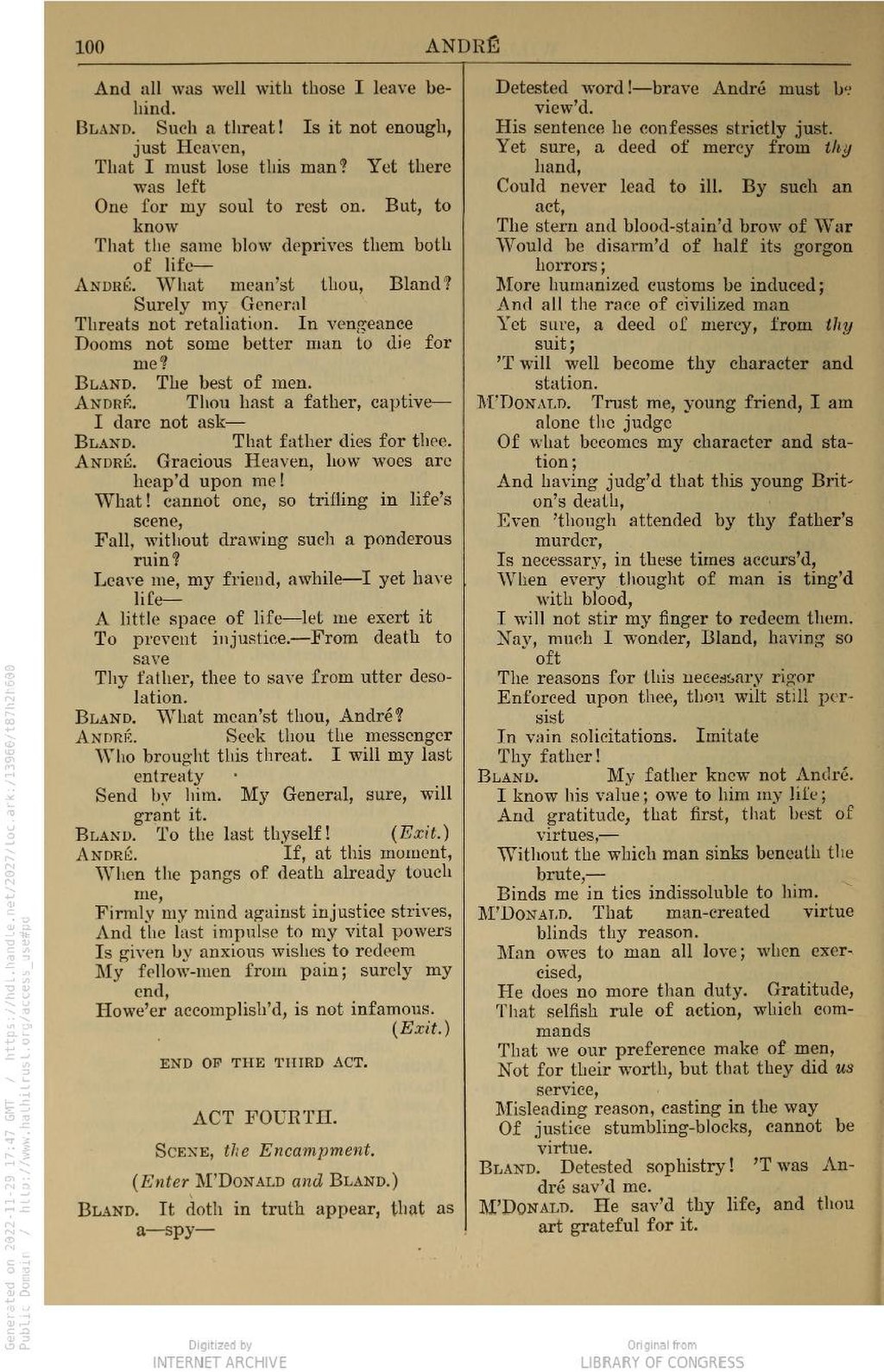And all was well with those I leave behind.
Bland. Such a threat! Is it not enough, just Heaven,
That I must lose this man? Yet there was left
One for my soul to rest on. But, to know
That tlie same blow deprives them both of life—
André. What mean'st thou, Bland? Surely my General
Threats not retaliation. In vengeance
Dooms not some better man to die for me?
Bland. The best of men.
André. Thou hast a father, captive—
I dare not ask—
Bland. That father dies for thee.
André. Gracious Heaven, how woes are heap'd upon me!
What! cannot one, so trifling in life's scene,
Fall, without drawing such a ponderous ruin?
Leave me, my friend, awhile—I yet have life—
A little space of life—let me exert it
To prevent injustice.—From death to save
Thy father, thee to save from utter desolation.
Bland. What mean'st thou, André?
André. Seek thou the messenger
Who brought this threat. I will my last entreaty
Send by him. My General, sure, will grant it.
Bland. To the last thyself! (Exit.)
André. If, at this moment,
When the pangs of death already touch me,
Firmly my mind against injustice strives,
And the last impulse to my vital powers
Is given by anxious wishes to redeem
My fellow-men from pain; surely my end,
Howe'er accomplish'd, is not infamous.
END OF THE THIRD ACT.
ACT FOURTH.
Scene, the Encampment.
(Enter M'Donald and Bland.)
Bland. It doth in truth appear, that as a—spy—
Detested word!—brave André must be view'd.
His sentence he confesses strictly just.
Yet sure, a deed of mercy from thy hand,
Could never lead to ill. By such an act,
The stern and blood-stain'd brow of War
Would be disarm'd of half its gorgon horrors;
More humanized customs be induced;
And all the race of civilized man
Yet sure, a deed of mercy, from thy suit;
'T will well become thy character and station.
M'Donald. Trust me, young friend, I am alone the judge
Of wiiat becomes my character and station;
And having judg'd that this young Briton's death,
Even 'though attended by thy father's murder,
Is necessary, in these times accurs'd,
When every thought of man is ting'd with blood,
I will not stir my finger to redeem them.
Nay, much I wonder, Bland, having so oft
The reasons for this necessary rigor
Enforced upon thee, thou wilt still persist
In vain solicitations. Imitate
Thy father!
Bland. My father knew not André.
I know his value; owe to him my life;
And gratitude, that first, that best of virtues,—
Without the which man sinks beneath the brute,—
Binds me in ties indissoluble to him.
M'Donald. That man-created virtue blinds thy reason.
Man owes to man all love; when exercised,
He does no more than duty. Gratitude,
That selfish rule of action, which commands
That we our preference make of men,
Not for their worth, but that they did us service,
Misleading reason, casting in the way
Of justice stumbling-blocks, cannot be virtue.
Bland. Detested sophistry! 'T was André sav'd me.
M'Donald. He sav'd thy life, and thou art grateful for it.
